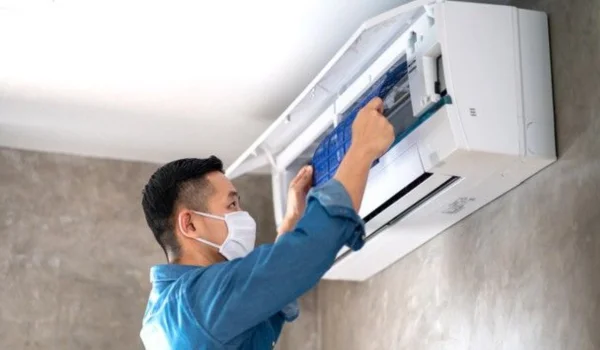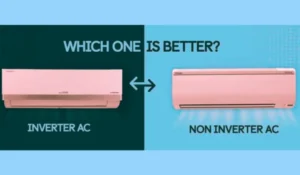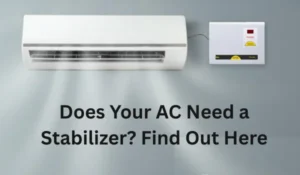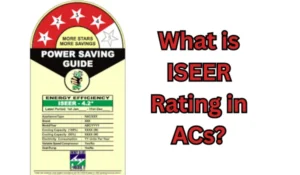If you’re anything like me, your air conditioner becomes your best friend during the scorching Indian summers. But here’s the truth—most people ignore the signs of AC trouble until it completely breaks down. I learned this the hard way a few years ago.
As a tech and electronics expert, I’ve had the chance to inspect, troubleshoot, and repair dozens of air conditioners—both mine and for friends and clients. Some issues are minor and easily fixed. But some, if left unchecked, can burn a hole in your pocket.
So today, I’m sharing 5 clear signs that your air conditioner needs professional attention—based on real issues I’ve faced and fixed, and backed by reliable sources like Daikin India, LG, Voltas service guides, and HVAC forums.
Let’s get into it.

1. Insufficient Cooling – Even After Running for Hours
My Experience:
One summer, my 1.5-ton inverter AC was struggling to cool a medium-sized room. Initially, I thought it was due to extreme heat outside. But when the room stayed warm even after 2 hours, I knew something was off.
What I Found:
- The air filters were choked with dust, restricting airflow.
- Refrigerant gas was low, reducing cooling efficiency.
- The outdoor unit fan motor was failing, preventing heat release.
What This Means for You:
If your AC runs for long hours but doesn’t cool effectively, it’s a major red flag. Possible reasons:
- Dirty filters or coils
- Gas leakage
- Faulty compressor
- Thermostat malfunction
Fix:
- Clean filters every 15 days during peak season.
- Schedule a professional check-up to inspect refrigerant levels and coil condition.
👉 Don’t ignore it—it affects not just comfort but also your energy bills.
2. Strange Noises from the AC Unit
My Experience:
Once, a friend called me over because his window AC was making a strange metallic clicking and humming sound. I dismantled the front panel and realized the fan blade was hitting a loose wire.
In another case, a buzzing noise turned out to be a faulty capacitor.
Common Noises & Causes:
- Hissing = Refrigerant leak
- Grinding = Motor bearing failure
- Buzzing = Electrical problem
- Clicking = Obstruction in fan or relay issues
Fix:
- Turn off the AC immediately if you hear unusual noises.
- Call a technician to diagnose the source before further damage happens.
Expert Tip:
Regular servicing helps detect these issues early, especially motor wear and loose electrical connections.
3. Water Leakage or Moisture Around the Unit
My Experience:
My own split AC once started dripping water inside the room. At first, I blamed humidity, but the problem worsened.
I discovered:
- The drain pipe was blocked with dirt and algae.
- The indoor unit wasn’t installed with a slight downward tilt, causing water to collect.
What You Might Face:
- Dripping water from indoor unit
- Water pooling near the window AC
- Damp patches on wall near split AC
Fix:
- Clean or replace the drain pipe.
- Ensure proper installation angle.
- Check for frozen evaporator coil due to gas shortage.
Pro Tip:
Use a wet/dry vacuum to clear clogged drain lines or ask a technician for a deep clean.
4. Bad Odor or Air Smells Musty
My Experience:
A client complained of foul, damp smells when the AC was turned on. I suspected mold buildup. When we opened the unit, the evaporator coil and blower were covered in dust and fungal deposits.
Common Causes:
- Mold or mildew on coils or filter
- Accumulated water due to poor drainage
- Dead insects or debris in ducts
Fix:
- Remove and clean the filters with mild soap.
- Spray coil cleaner on evaporator fins.
- Get professional AC servicing for internal sanitization.
Note:
Bad smell can affect indoor air quality and health—especially for kids or elderly people.
5. Frequent ON/OFF Cycling or AC Not Starting at All
My Experience:
This happened in my office where the split AC started turning off every 5 minutes. It was annoying and reduced efficiency.
In another instance, a non-inverter AC wouldn’t even start—no lights, no fan. It turned out to be a faulty PCB (Printed Circuit Board).
Possible Reasons:
- Thermostat failure
- Faulty capacitor or relay
- Shorted control board
- Voltage fluctuations damaging the PCB
Fix:
- Reset the thermostat settings.
- Use a stabilizer if your area has voltage fluctuations.
- If the problem persists, call an authorized technician.
👉 Inverter ACs are sensitive to power surges—always use a branded voltage stabilizer.
Bonus Tip: Monitor Your Electricity Bill
If your bill is rising but your usage hasn’t changed, the AC may be working inefficiently due to an internal fault. This is how I caught a gas leakage issue in my parent’s old unit—power consumption jumped suddenly despite fewer usage hours.
Final Thoughts: Act Before It’s Too Late
If you notice any of the signs above, don’t wait until your AC breaks down completely. Early repairs are cheaper, faster, and safer. I’ve personally seen how a ₹500 cleaning could have prevented a ₹5,000 coil replacement later on.
- As someone who’s fixed dozens of units, I always recommend:
- A bi-annual professional AC servicing (once before summer, once post-monsoon).
- Cleaning filters every 15–20 days.
- Using a surge protector or stabilizer for electronic safety.
- Checking refrigerant levels every 12–18 months.



